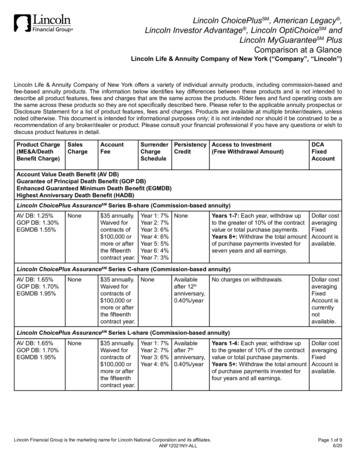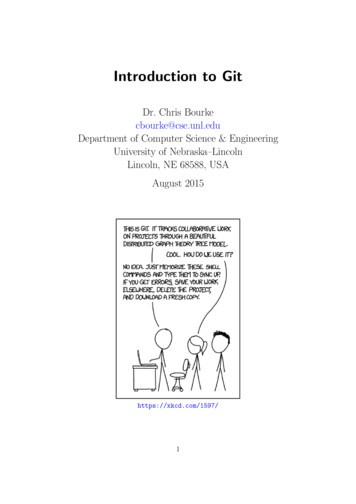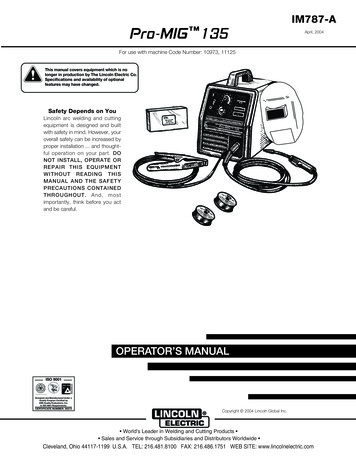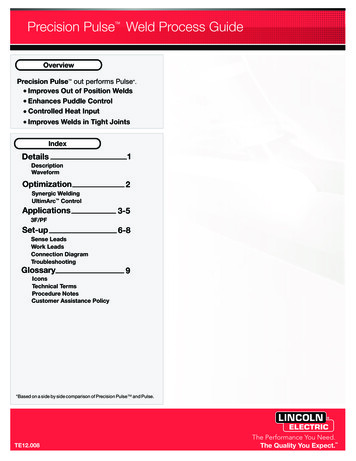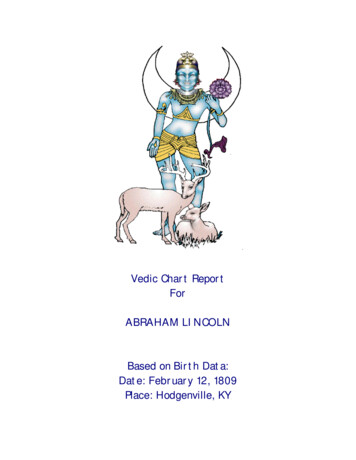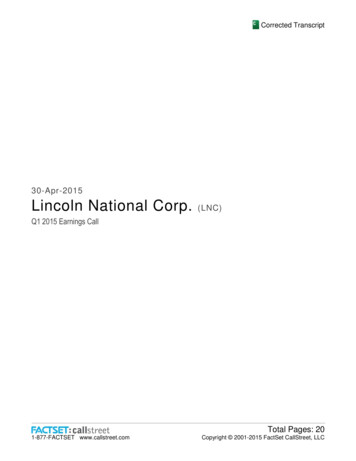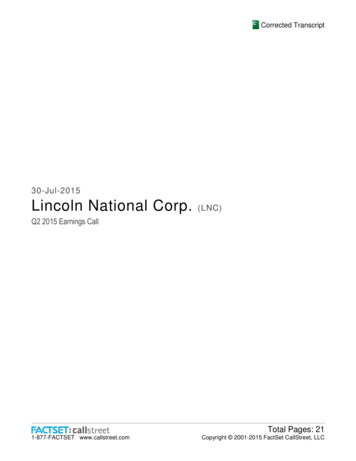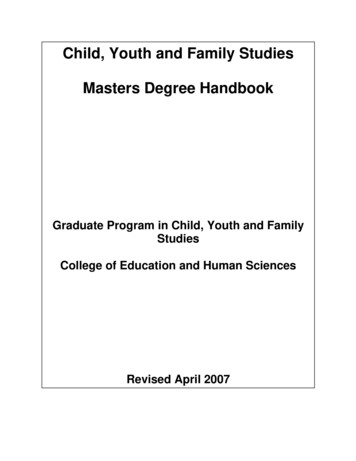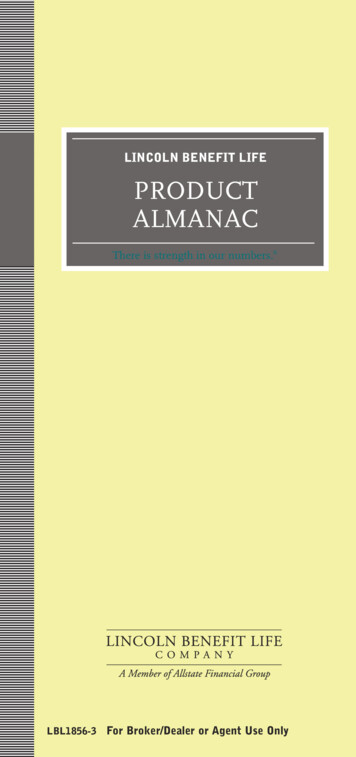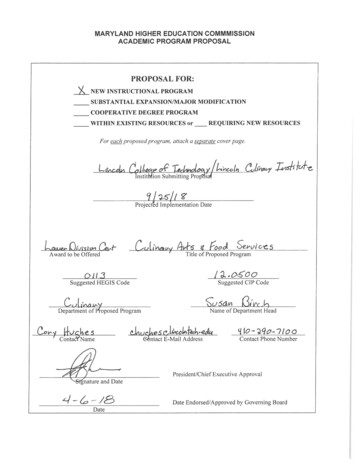
Transcription
Lincoln College of Technology/Lincoln Culinary Institute is requesting approval of the Culinary Arts & FoodServices Lower Division Certificate (CIP Code: 12.0500).A. Centrality to mission and planning priorities, relationship to the program emphasis as outlined inthe mission statements and an institutional priority for program development.The mission of Lincoln College of Technology/Lincoln Culinary Institute is to prepare its students to besuccessful in their chosen career field by delivering curriculum through a diverse set of educationalexperiences that will promote an appreciation of lifelong learning and assist with every graduate’sprofessional mobility in their occupation.Consequently, this proposal to offer a Lower Division Certificate in Culinary Arts & Food Services is bothconsistent with the institution’s mission and will contribute to producing its successful achievement.B. Critical and compelling regional or statewide need as identified in the State Plan:Maryland Ready’s first goal centers on maintain and improving the quality and effectiveness ofpostsecondary institutions. “Quality refers to the degree to which and institution successfully achievesits goals ” One measure of the success is the placement rates of the former culinary Arts Lower DivisionCertificate (CIP Code: 12.0503) which was at 100%. Toward the goal of improving effectiveness, LincolnCollege of Technology/Lincoln Culinary Institute holds two (2) Advisory Board Meeting each year invitingemployers in the field to meet and discuss how the college can meet the changing needs in the fields forwhich we train. Faculty are required to complete a variety of professional development includingtechnical upgrades in the fields they are instructing as well as instructional training on developing the artof teaching.Maryland Ready’s second goal is access, affordability and completion.Lincoln College ofTechnology/Lincoln Culinary Institute reviews its tuition annually and makes adjustments if it is warranted.All students at Lincoln College of Technology/Lincoln Culinary Institute are required to complete financialliteracy modules. Lincoln College of Technology/Lincoln Culinary Institute adheres to and maintains thecompletion rates set by the Accrediting Commission of Career Schools and Colleges.Maryland Ready’s third goal is diversity. As reported in the 2017 MHEC Annual Report S‐1 and S‐9 forms,Lincoln College of Technology/Lincoln Culinary Institute’s environment is “infused with diversity”including age, race, ethnicity and sex. The college has staff and programs including Career Edge thatsupports the community of diversity and acceptance to enhance learning.Maryland Ready’s fourth goal is innovation. Lincoln College of Technology/Lincoln Culinary Institute hasalways embraced the competency‐based education simply by the nature of the technical education.Incoming students are offered several ways to transfer in credits including direct transfer of like‐credits,test‐out situations where they can perform the tasks and are given credit, College Board AdvancePlacement (AP) courses, International Baccalaureate (IB) courses, completion of College LevelExamination Program (CLEP) testing, and completion of military experience through DANTES, DSST examsor as shown on an American Council on Education (ACE) transcript.
Successful course completion is based on a variety of methods including written exams/assessments aswell as practical/competency based assessments.Maryland Ready’s fifth goal is economic growth and vitality. Previously was discussed the use ofemployers as Advisory Boards to keep current with the industry related needs. This relates to the STEMeducation focus of K—12th grade and keeps the growth of the economy in the forefront of the collegestraining.C. Quantifiable and reliable evidence and documentation of market supply and demand in the regionand service area:The National Center for Education Statistics (NCES) defines ‘Culinary Arts’ programs as those that focuson the general study of the cooking and related culinary arts, and that may prepare individuals for a varietyof jobs within the food service industry. Includes instruction in food preparation, cooking techniques,equipment operation and maintenance, sanitation and safety, communication skills, applicableregulations, and principles of food service management.The table below demonstrates the state’s potential demand for graduates of programs like that proposed.This evidence of projected demand is based on the programs proposed Classification of Program (CIP)code 12.0500, Chefs and Head Cooks and (CIP) code 12.0501, Bakers land.shtml.Table IOccupational TitleChefs and Head .47%6.70%The table below outlines the current supply of graduates from Maryland programs with the CIP code of12.0500 (Culinary Arts).Table IISchool NameDegree LevelAssociatesAlleganyCollegeofMarylandLower ckAssociatesCommunityCollegeHowardLower DivisionCountyCertificateTaxonomyProgram NameCulinary ArtsGraduates2016201581512050320148120503Culinary Arts118212115120503Culinary Arts00000120504HospitalityManagement695762013 201257
MontgomeryCollegeLower Division linaryManagement926231120Lower Division 120504CertificateFoodand 2BeverageManagementCulinary Arts10Lower Division ollegeAssociates120503Culinary ogram.pdf.pdfThese two tables illustrate that although there is a projected increase of 316 jobs between 2014 and 2024,there is a lack of qualified candidates graduating from area programs to fill these needs.D. Reasonableness of program duplication, if any:While 5 other Lower Division Certificate programs that exist at Maryland’s post‐secondary institutions,the total number of graduated in the last 5 years from the existing programs is 223. In Lincoln College ofTechnology/Lincoln Culinary Institute’s past program there were 207 graduates. Adding the program willprovide the necessary available, qualified work force to assist the state in meeting its demand for thisprofession.
E. Relevance to the implementation or maintenance of high‐demand programs at HBI’s:Table II above demonstrates that no Histrionically Black College of University currently offer a LowerDivision Certificate in Culinary Arts & Food Services. As we implement this program, we will be lookingto develop and partner with the HBCU’s in the area in consideration of an articulation agreement to higherlevel degrees.F. AdequacyRelevance ofto curriculumthe supportdesignof ntmission ofwithHBIs:G.delivery andto relatedlearningoutcomesRegulation .10 of this chapter;Please see Attachment 1‐‐Course InformationH. Adequacy of any articulation;There are no current articulation agreements in place with this program.I.Adequacy of faculty resources consistent with Regulation .11 of this chapter;The faculty has not been identified as of yet. We will start that process with the approval of this proposal.Our federal accrediting body, Accrediting Counsel of Career Schools and Colleges, needs to have theapproval from MHEC prior to its approval which can take 60 to 90 days. The Dean will oversee thedepartment until the time that we hire a Director. We will start by hiring a Director of Culinary to headup the faculty search as well as teach the first few classes in the program. The person selected will haveat least an Associate’s Degree with at least five years of experience in the culinary field. The initial yearshould bring a staff of 3 instructors depending on enrollment with additional staff added as needed.Faulty NameFaculty TBDDegreeYesFull TimeXCourses TaughtCUL140SA—Introduction of Culinary ArtsFBM100SA—Food and Beverage ManagementIBP140SA—Baking and Pastry TechniquesCUL240SA—Foodservice OperationsCUL165SA—Advanced Skills I—Meats, Seafood and PoultryCUL175SA—Advanced Skills II—Meats, Seafood and PoultryCUL155SA—Principles of Food ScienceNTR101SA—Menu Planning and NutritionPER101SA—Personal/Private ChefCUL195SA—International Cuisine and CultureCUL280SA‐‐Externship
J.Adequacy of library resources consistent with regulation .12 of this chapter;The Library has some resources to support the proposed programs and will be upgraded to support thenew courses. The Library is open from 8:00AM to 10PM Monday—Thursday and 8:00AM—4PM on Friday.There is an on‐line Library recourse ProQuest, access through any computer.K. Adequacy of physical facilities, infrastructure and instructional equipment consistent withRegulation .13 of this chapter;Please see the Attachment 2 ‐‐list of equipment and Attachment 3 and 4‐‐booklists.L. Adequacy of financial resources with documentation consistent with Regulation .14 of thischapter;Please see Attachment 5‐‐Table1resources and Attachment 6‐‐Table2expenditures.Table 1: Resources Narrative:This reallocation of funds will not have a significant impact on the school since the funds thatwould have been spent on the old program will now move to the new program. When a school brings ina new program, the corporate office also allocates the school with a capital expenditure budget to set upthe equipment and other resources needed. The tuition which would have been for enrollment in the oldprogram will now move to the new program planning on a flat year of enrollment the first year of theprogram with increased enrollment to follow the preceding years. There are no grants, contracts or otherexternal sources of funding for this program.Table 2: Expenditures Narrative:There will be hiring of a Culinary Program Director in the first year who will also teach the initialclasses. There will be an additional instructor hired after the first 3 classes to continue to teach theadvanced classes. Additional staff will be added as needed depending on enrollment.
M. Adequacy of provisions for evaluation of program consistent with Regulation .15 of this chapter:Lincoln College of Technology/Lincoln Culinary Institute offers students two ways to evaluate courses andfaculty as well as all aspects of their school experience. The first are Mid‐Course Surveys which eachstudent takes at the mid‐point of each class. These surveys address areas such as the Instructors lectures,classroom atmosphere, equipment and curriculum needs. These are reviewed by the Dean, CampusPresident and Education Supervisor and acted upon as needed. The results are reviewed with eachInstructor to make adjustments, if needed, to insure the student’s success. The second is a StudentSatisfaction Survey which evaluates the total student experience, which are completed semi‐annually byall students. This is reviewed by the Corporate Education and Management Teams to assure the school’ssuccess. The results are also reviewed and acted upon by the School Management Team as well aspresented to students to assure students that they are heard and their concerns/comments are actedupon.Curriculum review procedures for faculty, staff and administrators are done through several means. Thereis a portal available to faculty to put through curriculum requests, changes and updates. This is reviewedby the Corporate Education Team and addressed as needed. There are curriculum counsels that schoolstaff and faculty can serve on depending on which department/area applies. Also the school has anindependent Program Advisory Committee for each occupational program. The purpose of the ProgramAdvisory Board is to review the established curricula of the program, instructional‐related programmaterials, equipment and facilities and student achievement outcomes (graduation and placement rates)as a means to provide the school with an external review of its programs.N. Consistency with the Commission’s minority student achievement goals:Lincoln College of Technology/Lincoln Culinary Institute is committed to high achievement goals amongstall of its students. As discussed prior in section B, there are many supports for all students to be successfuland reach achievement goals set by the Accrediting Commission of Career Schools and Colleges. Some ofthose supports include a chapter of the SVA (Student’s Veteran Association) which focuses on the needsof the school’s veteran population. ESE (Early Student Engagement) which is a program that focuses onassisting the adjustment for first time students from high school to college. All students are required toparticipate and complete financial literacy modules to assist them with their financial knowledge andsupport of all issues from budgets through loans and other financial matters. All students are informedof and have access to Studentlinc which is a confidential and professional support system that is free andconfidential. This can support students through many of lives challenges including anxiety, depression,diversity issues, grief, stress management, substance abuse and many other areas of concern. There istutoring with any instructor available to all students and if they prefer we assist in peer tutoring. Theschool has a food pantry for students that is at no cost to students. All students complete modules in ourCareer Edge program which addresses areas of soft skills including areas of self‐esteem through resume
writing. There are many supports at Lincoln College of Technology/Lincoln Culinary Institute to assistminority students meet achievement goals.O. Relationship to low productivity programs identifies by the Commission.This is not a low productivity program
Culinary Arts & Food ServicesColumbia, MDCUL120C Lower Division Certificate ProgramCIP Code 12.0500 -- SOC Code 35-1012Total Instructional Hours: 1080Total Program Credits: 39Program Length: Day – Approximately 66 weeks (including holidays and scheduled breaks)Eve – Approximately 66 weeks (including holidays and scheduled breaks)Program Objective:The Culinary Arts and Food Services program will provide students with a strong foundation on which to build asuccessful career in the food service industry. Students will be exposed to the core theory and practical applicationof the culinary arts and food services industry. Students will be exposed to a variety of topics including but notlimited to: Classical and Modern food preparation and cooking techniques, food and beverage management,foodservice operations, food science, menu planning and nutrition, international cuisine and culture and baking andpastry techniques.Upon completion of this program, students will be trained for entry level positions in the culinary and food servicesindustry as Line Cook, Prep Cook, Sous Chef, Chef’s Assistant, and Pantry Cook as well as other employmentopportunities in the Food Industry.Students will be required to complete out-of-class assignments in each course, except 0CCourse tion to Culinary ArtsFood and Beverage ManagementBaking and Pastry TechniquesFoodservice OperationsAdvanced Skills I – Meats, Seafood and PoultryAdvanced Skills II – Meats, Seafood and PoultryPrinciples of Food ScienceMenu Planning and NutritionPersonal/Private ChefInternational Cuisine and 454545454545450450450180108039Note: Course numbers and sequences are listed here for reference only. The actual delivery sequence of courses contained in this programmay vary depending on individual campus scheduling. Courses identified as requiring a prerequisite delivery are marked with a singleasterisk (*), as noted in the course description.Externship course is six weeks with a minimum of 180 hours of training at an approved externship site, working under thedirection of a Chef and/or Manager, following all internal rules and regulations. Most externship assignments are scheduledduring daytime hours for both day and evening programs. All weeks exclude holidays, course change days and make-up hoursfor absences during externship. Actual times are set by the externship sites. Students are responsible for transportation to andfrom the extern site, as well as meals.Maximum Time Frame to Complete is 58.5 Semester CreditsThe listing of credits is not meant to imply that credits can be transferred into college or other private careerschool programs. Transfer credits are at the sole discretion of the receiving school. 2018 Lincoln TechLast Reviewed: January 2, 20181 of 5
Course DescriptionsCUL140C – Introduction to Culinary Arts90 Contact Hrs (45 Lecture, 45 Lab); 3.5 CreditsThis course provides students with an introduction to the fundamentals needed to build a successful culinary career.It starts with an introduction to culinary history, an orientation to the professional kitchen and an overview of thecareer opportunities available in the foodservice industry. Students participate in culinary product identification andtaste exploration, equipment identification, standard measurement, and a thorough examination of knife safety andbasic knife skills. The theory and practice of proper foodservice sanitation is studied and leadsto national certification upon successful completion of the examination. Nutrition plays an important role and thiscourse also provides students with the knowledge of the role of nutrition science in various segments of the foodservice industry. Students learn how to apply healthy and nutritious food selection and preparation to classical andmodern cuisine. The path to professional and personal development starts here with the commitment to the higheststandards of attitude, attendance, dress, respect and lifelong learning.Prerequisite(s): NoneFBM100C – Food and Beverage Management90 Contact Hrs (45 Lecture, 45 Lab); 3.5 CreditsThis course teaches the use of restaurant control systems in menu development, accounting principles, staff training,table service and wine technology. Students learn to create and design menus. Students will explore accountingprinciples with foodservice industry comparisons. Basic computer literacy and restaurant-related computerapplications are introduced. Students study the management process, effective communication skills, thesupervisor’s role in decision-making and problem solving, effective use of delegation, conflict resolution,motivational techniques, and stress management. Organizational design, line and staff relationships and employeetraining programs are also presented in this course. Knowledge and techniques of table service are explored, guestcheck control, federal, state and local control laws and third party liability. Beverage technology studied includesdistinguishing wines by grape, variety, growing region, production process and proper service.Prerequisite(s): NoneIBP140C – Baking and Pastry Techniques90 Contact Hrs (45 Lecture, 45 Lab); 3.5 CreditsThis course explores the world of baking and pastry making through the eyes and needs of the culinary student. Thebaking skill, knowledge, experience and perspective gained through this course leads to the development of betteroverall chefs, managers and business owners. Each aspect of the baking spectrum is examined through its functionof ingredients, mixing methods and finishing techniques. Basic bread baking principles explain how a simpleformula of water, yeast, salt and flour is transformed into bread with irresistible taste, texture and fragrance. Danishpastries, pies
Lincoln College of Technology/Lincoln Culinary Institute is requesting approval of the Culinary Arts & Food Services Lower Division Certificate (CIP Code: 12.0500). The mission of Lincoln College of Technology/Lincoln Culinary Institute is to prepare its students to be successful in their c
